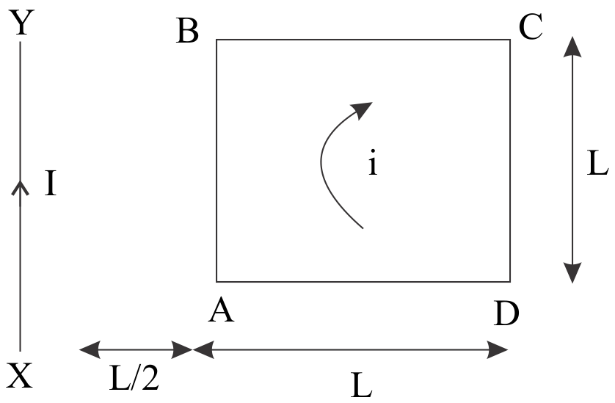Question
Question: A square loop ABCD carrying a current I, is placed near and coplanar with a long straight conductor ...
A square loop ABCD carrying a current I, is placed near and coplanar with a long straight conductor XY carrying a current I, the net force on the loop will be:

A.3π2μoIi
B.2πμoIi
C.3π2μoIiL
D.2πμoIiL
Solution
Hint:- In this type of question firstly we have to find the magnetic field strength at the given distance from the current carrying wire. Then after finding the magnetic field strength we have to calculate force on the loop wires which are parallel to the current carrying wire and finally we have to find the resultant of the forces.
Complete step-by-step solution :As given in figure we have a current carrying wire having current of I ampere in it.
So we all know that magnetic field strength at particular point is given as :
Mathematically, B=2πrμoI where B is magnetic strength
I is current on the wire
r is distance from the loop wire from current carrying wire.
μois permittivity of free space
∴in the given figure wire AB and CD will contribute in the force because they are parallel to current carrying wire while wire AC and BD will not contribute in the forces because these are perpendicular to the current carrying wire.
Now ,we know that force on the wire will be equal to Bil
Mathematically F=Bilwhere iis current on the loop wire.
So ,firstly we will find the force on the wire AB
Magnetic field at wire AB will be BAB=2πrμoI
So force on wire AB will be F=BiL F=2π2L(μoI)iL F=πμoIi on solving this equation ,we get
Now we will find the magnetic field strength at wire CD
BCD=2π23Lμ0I
BCD=3πLμoI
Now we will find the force on wire CD-
FCD=3πLμoIiL
FCD=3πμoIi
∴current on the both wire is in opposite direction
So resultant forces will be Fnet=FAB−FCD
Fnet=πμoIi−3πμoIi Fnet=3π2μoIi
So the correct option will be option number A.
Note:-
The current carrying wire produces magnetic field strength. The magnetic field strength is different for the different locations. Magnetic field strength produces force on current carrying wire.by the use of the right hand thumb we can find the direction of force and magnetic field. By adding both the force vector we can find the direction of net force
